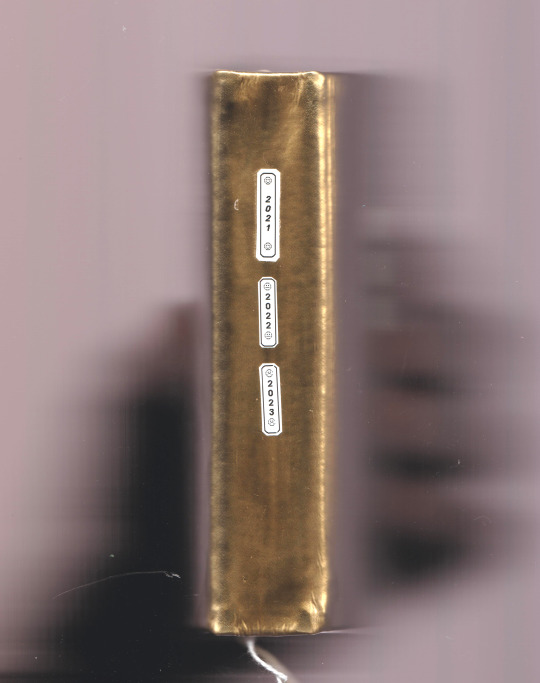#journal 2021
Explore tagged Tumblr posts
Text
My diary 2021 - week 2
Image – people sitting in thick snow in Madrid – first snowfall in 50 years January 8th, Friday Dream on Luci app. Debating on Twitter. Rude followers repeating “but it’s clearly (not) set out in rules”. Point of driving to go for a walk is for people not near green spaces. Setting up series of blocks affects those most in need of free exercise outdoors. Government advertising before and after…
#Falmouth Cornwall in lockdown 2021#January 2021 diary entry#journal 2021#my 2021 journal diary entries#Snow in Madrid#vaccine concerns roll-out 2021#week 2 January 2021#what I did in lockdown
0 notes
Text

🎀February 2021🎀
24 notes
·
View notes
Text

Above is a photo of a page in my 2021 journal. It includes an original entry written on 11/3/2021 and two margin notes dated 12/8/2021:
11/3/2021
"The average human life span is absurdly, terrifyingly, insultingly, short." From the book Four Thousand Weeks. Written at Preservation Coffee House Modesto, California on Wednesday 11/3/2021 at 4:46pm
My margin notes 12/8/2021
The young dread aging. They can't know that without it, life lacks richness and depth.
No one tells you when you are young about the rich evolution of aging. There is no language to convey it. And, we live in different universe's, young and old.
End of entries
#journaling#writing#aging#12/8/2021#the young dread aging#aging brings richness and depth to life#Four Thousand Weeks
25 notes
·
View notes
Text






The French Dispatch (2021) Directed by Wes Anderson
#the french dispatch#wes anderson#2021#anthology film#comedy drama#quirky cinema#visual storytelling#ensemble cast#timothée chalamet#benicio del toro#adrien brody#tilda swinton#frances mcdormand#bill murray#owen wilson#cinematography#retro aesthetics#colorful visuals#newspaper stories#literary cinema#satire#french culture#art and journalism#love and revolution#intellectual cinema#nostalgic filmmaking#meticulous design#period film#modern classic#cinema of whimsy
13 notes
·
View notes
Text
There's something to be said about when the clouds dissolve into the sea and you can’t tell when the sea starts and where it ends. There’s something to be said about studying by myself, and there’s something to be said about going to the lab. Slipping on my lab coat. Walking in the rain without an umbrella or rainproof coat. Drinking old coffee in the early afternoon. Sleeping in the courtyard and breaking laws. Something to say about banned books and flannels, painted nails, and blonde hair. Early fall when it’s still hot outside. Diary entry after diary entry about the same person in different voices.


#journal entry from 2021#ive been going through my journals and somethings still stick with me#journal#journaling#my journal#diary#journal entry#diary entry#studying#studyspo#student#study life#study motivation#studyblr#student life#study blog#studyblr community
11 notes
·
View notes
Text

<3 DECEMBER 2021 PLAYLIST <3
411 notes
·
View notes
Text
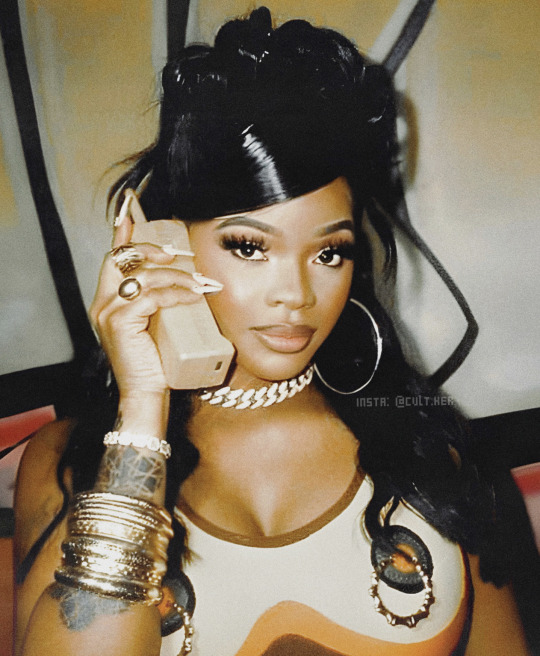


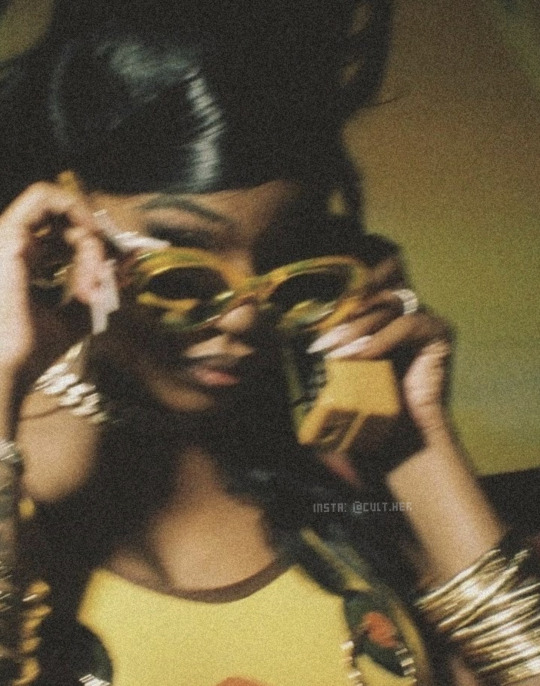
JT & Caresha of the City Girls attending Saweetie’s FreakNik themed Birthday Party, 2021.
#cult her#fashion#fashion blogger#black culture#black women#barbie#journalism#mixed media#city girls#thegirljt#saweetie#caresha please#freaknik#90s style#90s fashion#90s#2021#i been was supposed to post this.
39 notes
·
View notes
Text
Jarvis Cocker: At the end of 1996, I had “a nervous breakdown”
Kate Mossman of The New Statesman talks to Jarvis Cocker, September 2021
The singer on nostalgia, hating David Cameron, and how crashing a Michael Jackson performance had “a toxic effect” on him.
Jarvis Cocker leans on a table in the courtyard of the House of St Barnabas, a members’ club and homeless charity, and one of the only bits of London’s Soho that does not bear the marks of the interminable Crossrail project. Cocker says he’s not one for conspiracy theories, “but there’s a lot of dark mutterings about what has happened while everybody’s been locked away. You can see it in Soho, where loads of building work’s gone on. They took an opportunity. Cement’s gone up in price because there’s none left.”
He’s not as tall as he is in your mind’s eye – a solid 6ft 1 – but he cuts a stately figure in green cords and a high-quality lilac shirt. Here, in a moccasin-style shoe, is the foot that was broken, along with his pelvis and ankle, when he fell out of a window in Sheffield pretending to be Spiderman. (He spent months as a young man gigging from a wheelchair.) Here is the rear that was waved at Michael Jackson, in a life-changing moment it still upsets him to talk about. Here are the long legs that bent like those of a freshly born foal on stage, and here are the glasses that were held on his face with an elastic band so he could execute his moves. These long, smooth fingers would frame his face, or flick his “V” signs. As sombre as he is, seating himself on a bench alongside the New Statesman, he is the only pop star that most people under 80, regardless of their artistic ability, could have a crack at drawing.

You feel wary of going straight in on “the Nineties” – it must be such a bore – yet Cocker brings them up right away, talking about a song called “Cocaine Socialism” which he wrote for his band Pulp in 1996, at their commercial and critical height. It was all about New Labour’s courtship of pop stars. The title was ironic he explains, because “cocaine will make you not give a fuck about any other member of the human race”. Cocker shelved the song because he thought it might actually stop the people of Britain voting Labour – a sign, he says, of his overweening ego at the time.
When I was 14, a friend gave me a perfectly executed cartoon of Cocker, drawn on squared paper in a maths lesson and titled “My future husband”. It is often a source of frustration for musicians when their biggest audience proves to be teenage girls, but this is to overlook the power of teenage girls – and teenagers in general – to work up an intensity of feeling that all but creates a career. Cocker should know, because he conceived of his future – conceived of Pulp, “planned my whole life out” – at the age of 14 in an economics lesson, writing it all down in exercise books which he recently unearthed in an attic.
He had a written manifesto, “very earnest, about how we’re going to get famous, have our own record label and radio station, and help other bands, and break the tyranny of the major labels”. And he’d drawn pictures, too, of an arm, with “major record company” tattooed on it and a meat cleaver saying “Pulp Incorporated”, ready to chop off the hand.
“It was supposed to be some socialist empowerment of the people. It wasn’t just: ‘I’m going to buy a big house in Barbados and have a jet ski’.”
Cocker’s proudest moment in a 30-year career was when Martin Amis agreed with something he’d said, when they appeared together on a TV talkshow approaching the millennium. Jarvis had stated that, in the 20th century, fame had replaced heaven as our ultimate goal, our way of cheating death. His own moment of fame, when it came, was sizeable, but it took him 15 years to get there: Pulp formed in 1981 – they should have been a post-punk band rather than a Britpop one.
In 1996 Melody Maker judged Cocker the fifth most famous man in Britain – after John Major, Frank Bruno, Will Carling and Michael Barrymore. Two years later, the novelist Nick Hornby reflected, “Jarvis Cocker is an acute and amusing chronicler of our life and times… but sometimes… you wish he’d communicate via chat show or letter rather than song.” This he has done, and often. Jarvis has been Jarvis for the last 25 years, in radio, TV, the written word – and perhaps less so in music, in the popular imagination. When you have lingered so long outside fame’s door, fully formed and ready to go, you must be loath to make an exit. Only in the garden of a private members’ club can he go about peacefully; he cycles in London, without a helmet, so you suspect he is recognised often, moving at speed.
Cocker shows me photos of his new bike on an old iPhone – a Moulton small-wheeled cycle, described by Norman Foster as the greatest work of 20th century British design. There are racks back and front, “to put yer bag on”. “I have spent a lot of time on quite random, trivial things,” he tells me. When his beloved 1970 Hillman Imp car finally gave up the ghost, he had it crushed into a cube and gave it away to a fan.
Cocker was in the Paramount Hotel on West 46th Street, New York, in December 1996 when a girl called Imogen called from the New Labour office and asked for his endorsement.
“I’d been to some event down Whitehall,” he recalls. “A kind of wooing event, and I’d felt really weird about that. It’s hard to imagine now. I was 16-17 when Thatcher got in, and a Labour government seemed like a fantasy. I felt very conflicted, because I really wanted it to happen but something just seemed wrong. Even at that time – a quarter of a century ago – I thought, ‘You should be doing politics, not trying to get some endorsements from some people in bands’. There was a desire for it to happen, and then this disease. It felt like getting chatted up.”
Imogen had tracked Cocker down during what he calls, perhaps surprisingly, a “severely traumatic part of my life”. At the end of 1996 he was having what he refers to today as a nervous breakdown. When the telephone rang in his hotel room, he assumed the suite was bugged. He’d gone to New York around Christmas time and, alone and anxious, found himself unable to face the crowds. But he also struggled to stay indoors, tormented by the aesthetics of his hotel room – “super designed, with a giant picture of a Vermeer painting, a woman pouring some milk out of a blue jug. You walked in to an art installation, and I was in a fragile state of mind.”
Cocker’s descent – which seems to merge with the ascent of New Labour in a lurid kind of fever dream – began with his trespassing the Brit Awards stage in February 1996 during Michael Jackson’s performance of “Earth Song”. “I don’t really like talking about that particular incident,” he says, looking down at his knees. “People said at the time that it was a publicity stunt but it wasn’t really like that. It had a toxic effect on my life.”
There is a considerable mismatch between the folk memory of the moment, and the memory held by the perpetrator himself. To most, Cocker’s actions look more heroic as the years go by: the last cry of a bloated Eighties megastar defeated by British indie, or something to that effect. Jackson’s pageantry seems worse now than it did at the time: the white messiah robes and outstretched arms; the children lining up to embrace him; the rabbi bowing his head for a kiss. The pipe cleaner figure of Cocker floats on stage looking puzzled, wafts an imaginary fart at the audience (with his bottom clothed) and briefly raises his T-shirt. Hardly something to be arrested for (as he was, before being released without charge) but the 1990s are a draconian place, when you travel back in time.
[see also: Bridget Jones and the Blair years]
Cocker was represented, in his assault charge, by the comedian Bob Mortimer, a former solicitor. David Bowie’s personal film crew were able to provide tapes shot from a certain angle to prove that he had not, in fact, knocked into any children when taking the stage. But there was condemnation from Damon Albarn (“he’s got some very odd ideas about reality”) and Jackson (“sickened, saddened, shocked, upset, cheated and angry”).
The tabloids subjected him to feverish attention. Cocker had always talked about drugs – the liner notes of Pulp’s single “Sorted For E’s & Wizz” showed you how to make a drugs wrap (“Ban This Sick Stunt” said the Daily Mirror). And he’d always talked about sex – he watched a lot of porn in hotel rooms on tour. Now, there were kiss and tells, and an attempt by the Sun to engineer a meeting between Cocker and his estranged father in Australia.
What thoughts were passing through his mind when he stood up and walked towards Jackson’s stage? He won’t say. “One thing I will say is that people are still convinced that I pulled my trousers down and showed my bottom. And it’s really not true. That’s when I realised what a c*** David Cameron was.”
In November 2011, he explains, the Observer put celebrities’ questions to the new prime minister of the coalition. Cocker asked Cameron whether he really understood the phrases “futures” and “derivatives”. Cameron gave a long answer to prove that he did and added: “I was there that night, at the Brit Awards. I saw him led away. I saw his bum.”
Cocker stirs his Americano.
“I just thought, ‘OK, you are a liar. You’ve just shown yourself to be a liar and a complete twat’.”
In the New Statesman that year, Cocker wrote a reflection on hangovers, inspired by the one he had the day after Tony Blair was elected. The hangover lingered, as he criticised New Labour’s treatment of single mothers, students and the disabled. It lasted 13 years, he said. It ended when Cameron got in – not because things were better, but because that’s when he started drinking again.
There is a photograph of Cocker as a long-legged child pictured with his mother, granny, sister and aunties outside their terraced house in Intake, a suburb of Sheffield. With her red pixie haircut and large specs, his mother, an art student, looks just like an indie girl from the 1990s – or a member of Pulp – in a strange cultural collision of the original hippies and the Sixties revival decades later.
Cocker lived on the dole in the Eighties trying to get his band off the ground. During the Britpop era, Labour’s Welfare To Work scheme made such a life much trickier, inspiring a campaign by Oasis’ manager Alan McGee. The dole must have had a huge impact on people’s ability to pursue creative work?
“Probably for six months, and then you get lazy,” Cocker says. “Not wanting to sound like Norman Tebbit, but you do, and that’s what drove me away from Sheffield – people were dropping like flies, having drug overdoses or losing it, and I thought, ‘It’s only a matter of time before I end up there’. So that’s when I started hatching my escape plan.”
His ticket out – a place to study film at Central Saint Martins in London – produced “Common People”, one of the most famous songs of the 20th century. Pulp were more refined, classy, slippery and sardonic than other Britpop bands. The image of working-class life as seen through the eyes of the song’s Greek art student gets to the heart of Cocker’s use of irony: he was interested in perceptions of class difference, perceptions of the north-south divide, as much as the real thing.
Having lived in the south for 35 years, he tells me the BBC’s insistence on using regional accents for announcers is a patronising attempt to keep people in their place. His mother became a Tory parish councillor for the village of Carlton in Lindrick, Nottinghamshire. In 1998 she told the Mirror, in an embarrassing interview, that she admired Thatcher – until the third term, when the prime minister became a megalomaniac. “I raised Jarvis on Tory values that if you’ve worked hard all your life, you want to keep what you’ve earned,” she said. Her son tells me he doesn’t agree with his mother’s support of Brexit – “but you won’t find many people who are going to say that everything’s going to plan. We’re on the downhill, and everybody’s got their own theories of why that is.”
Unlike his mother, Cocker has voted Labour since he was old enough to vote. “I can’t imagine voting for any other party,” he says, but that doesn’t mean he’s excited by the current one. “Corbyn I was excited about. But having spent a lot of time moving between France and here, his inability to come to any position on Brexit finished it for me.” Keir Starmer’s Labour, he says, “feels like the politics of opposition. It’s happening to the left all over the world, isn’t it? People have started wondering what level of dictatorship would be OK.”
A few years ago he visited the Magna Science Adventure Centre in Rotherham which recreates the world of the steel mills. Watching the installation of a “big melt” – when molten steel was poured into giant electric arc furnaces – made him strangely emotional. “It must be some kind of folk memory,” he says. “It was awful work, and loads of people got f***ed by the time they were 40. But there was some result and that’s what people miss – that there isn’t anything to glue people together in that way. Imagine working in a shipyard. After six months, suddenly there’s this big, massive f***-off ship and you’ve been part of that.
“There is a nostalgia, not for vibration white finger or lung disease, but for times when people worked together and there would be a result. I’m not an authority. It’s not for me to tell the Labour Party what to do, but I think – well, I thought I stumbled on something.”
He still praises the Sheffield city council, once nicknamed the “Socialist Republic of South Yorkshire”, which allowed children to travel for 2p on buses. He once said that when things took off for Britpop, he thought he was going to be part of something that changed society, like punk did, but it just turned out to be showbusiness.
Of all the extra-curricular jobs Cocker has done, the one the public took to most, which really seemed to fit him, was his gig as a DJ on BBC Radio 6 Music, running his Sunday Service show. His voice was as much a part of his sex appeal for teenage girls as his looks had been. The show explored a mundane but deeply nostalgic aspect of British culture: that time on a Sunday afternoon when everyone felt flat because it was nearly time for the week to start again, and you hadn’t done your homework.
He’d resisted radio for a long time because of his father. Mac Cocker walked out in 1970, when Jarvis was seven, leaving Sheffield for Sydney, where he began a 33-year career with the Australian Broadcasting Corporation. His gentle Yorkshire accent was appreciated on the airwaves. He had a show called The Night Train on Saturdays (Jarvis has a Radio 4 show for insomniacs called Wireless Nights); and a show called The Globetrotter on Sunday afternoons, and another called Vinyl Museum. High of forehead with long hair and large National Health-style specs, Mac wore a tank top not unlike those his son wore in Pulp. He sang with a band called Life On Mars.
Traditionally, Cocker doesn’t talk much about his father. As we begin to do so, a very tiny and very hairy caterpillar makes its way along the edge of the table in front of him. It is barely a centimetre long, with legs so fine they move in little ripples of dark and light. Cocker does what all humans do when faced with a caterpillar and tries to persuade it to clamber aboard the nail on his index finger. After two or three refusals, it does so.
Mac Cocker left his son with small bits of information about himself, like a copy of Harold Pinter’s The Birthday Party on the shelf. When Jarvis was 12, he came to visit, bringing records with him.
“That’s when I found out he was a DJ. He’d obviously just gone into some record label and picked up some records and gave me them. I ascribed a real meaning to them, but it was just promos. They were wank. They were just these really shit records! Anyway…”
Cocker wonders if he was propelled into music because of his father, but explains that any biological imperative, if it comes from an absent parent, remains a mysterious thing. “I know it must come from him, because my mother is so tone-deaf. But if you don’t know him, it’s like it’s come from somewhere supernatural.”
His family would say, you’re just like your father – “but usually as a negative thing. It was strange to be brought up with this cloudy non-presence.” Cocker and his father struck up a form of relationship eventually, whenever Pulp toured in Australia.
“You’re telling yourself that you sprang from the loins of this person, but if you don’t know the person, that disconnect is really uncomfortable. What used to drive me mad was having really inconsequential conversations. When you tried and go on to the deeper stuff, it was just words… I could tell he was always very uncomfortable, and I’m not exactly the world’s best person for talking about emotions, so I was always terrified that an awkward silence was going to descend.”
Did they at least share music? What kind was Mac into? “Jazz,” he says, in disbelief. His father left a record behind in the Sheffield house – an EP by the Sixties French singer Gilbert Bécaud. “You know when singles have those big centres? He’d made a centre for it by cutting a bit out of a Player’s cigarette packet. That had always been in the house. I knew it was his, because his name was written on the back of it.”
When Mac was dying, Cocker visited him in Australia and took the Bécaud EP with him.
“I just Blu-Tacked it on his wall. It was the only thing I had of his. I just thought, because he went a bit away with the fairies before he died, I thought, that’s something from his past. I just stuck it on there.”
And left it?
“Yeah.”
In October this year, Cocker will release his own album of French music – songs originally sung by Françoise Hardy, Serge Gainsbourg, Jacques Dutronc – to accompany the forthcoming Wes Anderson film The French Dispatch, which is set in the 1960s. It features a fictional pop star called Tip Top who is modelled partly on Cocker. Anderson directed his intonation, his delivery, in the studio. Cocker’s French, he says, is “something I should be ashamed and embarrassed about”, despite the fact he got to A-level standard, was married for six years to the French stylist Camille Bidault-Waddington, lived in Paris, and has a French son. He regularly travels to France to visit Albert, now 18, and stays in an apartment backing on to the Hotel Amour. Albert looks just like him. During the pandemic he got around the social distancing rules by hugging him through a bed sheet.
In 1998 Cocker told the Sydney Morning Herald “I just want to find a way of being an adult without it being boring.” Does he feel he’s achieved this? “I know I’m still slightly immature,” he says. “I mistrusted adults as a child. But there’s something really grotesque about people who refuse to grow up. When I became a father, people were always saying [he whines] ‘You’re going to change’. But actually it doesn’t change you, it just opens up a new bit of you. It was a real revelation to me, to realise I had that instinct. I found it liberating. As you move through life, these little doors open. The other ones are still open as well.”
He thinks all human beings believe they just missed a golden age. For him it was the Sixties, the decade in which he was born, “when the Beatles were still a group. They came to an end as the Seventies came, and I was six or seven. That’s the same year that me dad left. It felt like, OK, you’ve had your fun.
“When you’re a kid and you’re looking at the adult world,” he ponders, “you’re only looking at what’s current at that time. Like me wanting to be a pop star. By the time it happened, pop stars were on their way out. By the time you’re old enough to be part of it, it’s gone. So in a funny way, kids live in the past.
“I think that’s the fatal flaw in the whole Britpop thing. I don’t like to say that word, because it was an invented label – but that was the fatal flaw, and it takes us back to the fatal flaw of electing a Labour government and believing it would be the same as it used to be. Let’s make the Beatles again… Oasis really tried to do that, but you can’t make a period in history happen again.”
As a songwriter, Cocker telescoped himself into the future with “Disco 2000” and “Help The Aged”. The former felt open-hearted but the latter, intended as a kiss-off to youth-obsessed politics, sounded sour at the time.
“It always used to drive me mad, people going on about, ‘Oh, you’re so ironic’,” he says. “It would be rubbish to devote your life to doing something that was insincere. I guess I’ll often undercut what I’m singing about as I’m doing it – and that’s just because of the way my mind works. As I think one thing, I’ll think the opposite as well. Later in life, you discover that you are allowed to have two thoughts: it’s a natural function of the way your mind works.”
Some would say that, as you progress through life, you get better at trusting your instincts?
“I think if you just follow your instincts your whole life, you’ll be a monster.”
Cocker brightens, perhaps because our interview is ending. When he talks about his hobbies, he gives a big leonine flash, raising his silvery eyebrows above the frames of his glasses.
I phoned him a few weeks later, after the summer, to see what he’d been up to. He was at a secret location in Spain, making a movie he wasn’t allowed to talk about. A pandemic spent going through his loft, and noticing priceless keepsakes among the rubbish, has inspired him to write a book about pop and nostalgia – Good Pop, Bad Pop – to be published next year.
He is dying to be back on stage after two years off it. “I’m touching a wooden table now. We’ve already had to postpone this tour twice.” And he talks about Labour again – he really seems to care! You think back to his manifesto, his teenage sketch of a meat cleaver chopping off a hand. Then you look at a life lived gently, moving between projects, ponderings and “random trivial things” – and you wonder what his revolution would look like.
Jarvis Cocker’s new album “Tip Top: Chansons d’Ennui” is released on 22 October.
#Jarvis Cocker#Pulp#Pulp band#1996#Britpop#Different Class#This Is Hardcore#it's a good writeup#music interviews#music journalism#music#musicians#90s music#2021
19 notes
·
View notes
Text

🐸March 2021🐸
7 notes
·
View notes
Text
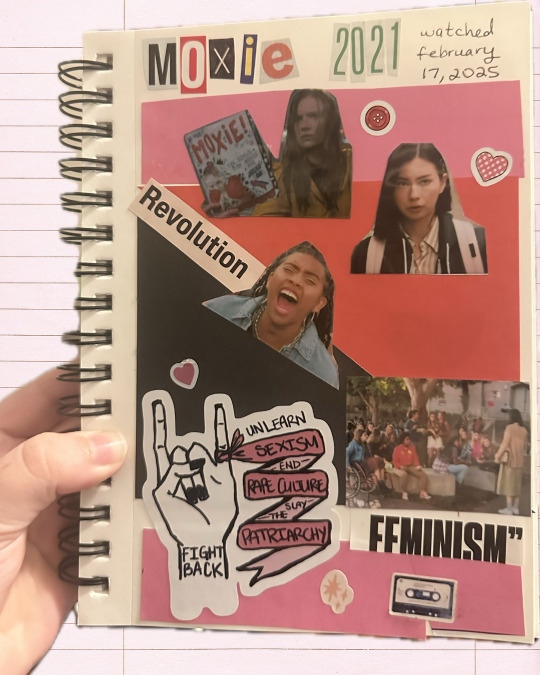
My 2025 film journal entry for Moxie, the latest Leftist Teen Drama Movie Special (now streaming wherever you get your podcasts!)
Check out more of my junk journal on Instagram.
5 notes
·
View notes
Text
So, why do I write then?

Above is a photo of my December 8, 2021 journal entry. The typed version of the entry follows:
12/8/2021. 1:09pm Upstairs. Preservation Coffee House
So, why do I write, then? It's really not about you, future reader. It's more about embracing the phenomenon of basic being--catching existence on the fly. Any point in time, any "now"---is a potential integration opening.
28 notes
·
View notes
Text
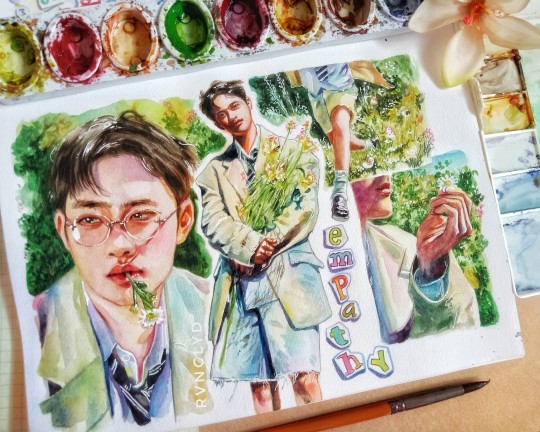
gather the rosebuds while you may
#empathy got me thru 2021 and icb its been 2 years lmao time flies 🥲#exo d.o.#do kyungsoo#exo fanart#d.o.#kyungsoo fanart#kpop fanart#그림#팬아트#일러스트#kpop artwork#watercolor painting#illustration#watercolor illustration#watercolor sketch#watercolor journal#journal#journal spread#kyungsoo empathy#d.o. empathy#exo artwork#드로잉#exo do kyungsoo#kpop sketchbook#kpop art#exo aesthetic#watercolor#traditional art#watercolor art#kpop watercolor
95 notes
·
View notes
Text

You are not damaged. You are not socially handicapped. You are young and you are learning how to live. Write that down. I AM VERY YOUNG AND I AM LEARNING HOW TO LIVE. Tape it to the wall by your bed and read it every morning. You are very, very young. You are learning how to live.
Ask Polly: Help, I’m The Loneliest Person In The World!
#another 2021 journal entry... this one from december#doing applications. mostly stuck inside. sun set at 4pm... the agonies were many#journal#collage#art#heather havrilesky
3 notes
·
View notes
Text
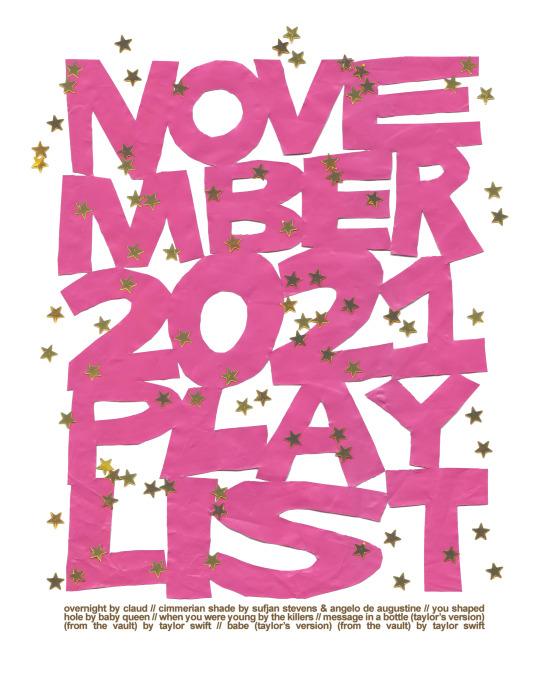
NOVEMBER 2021 PLAYLIST
240 notes
·
View notes

